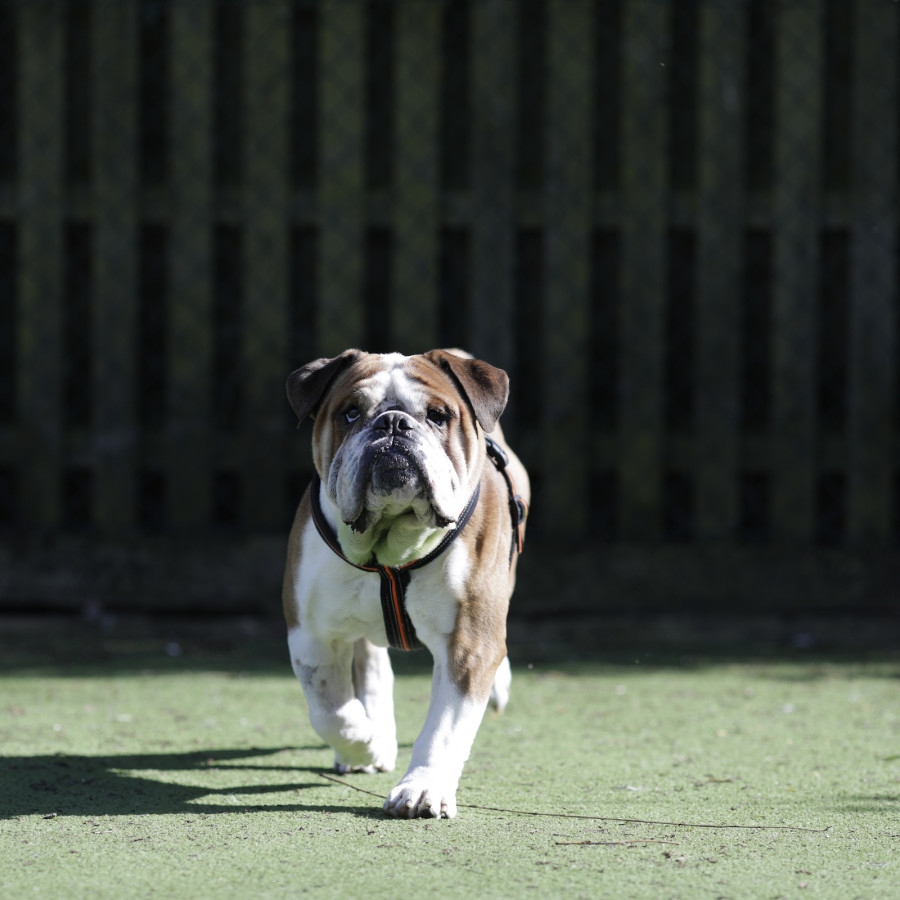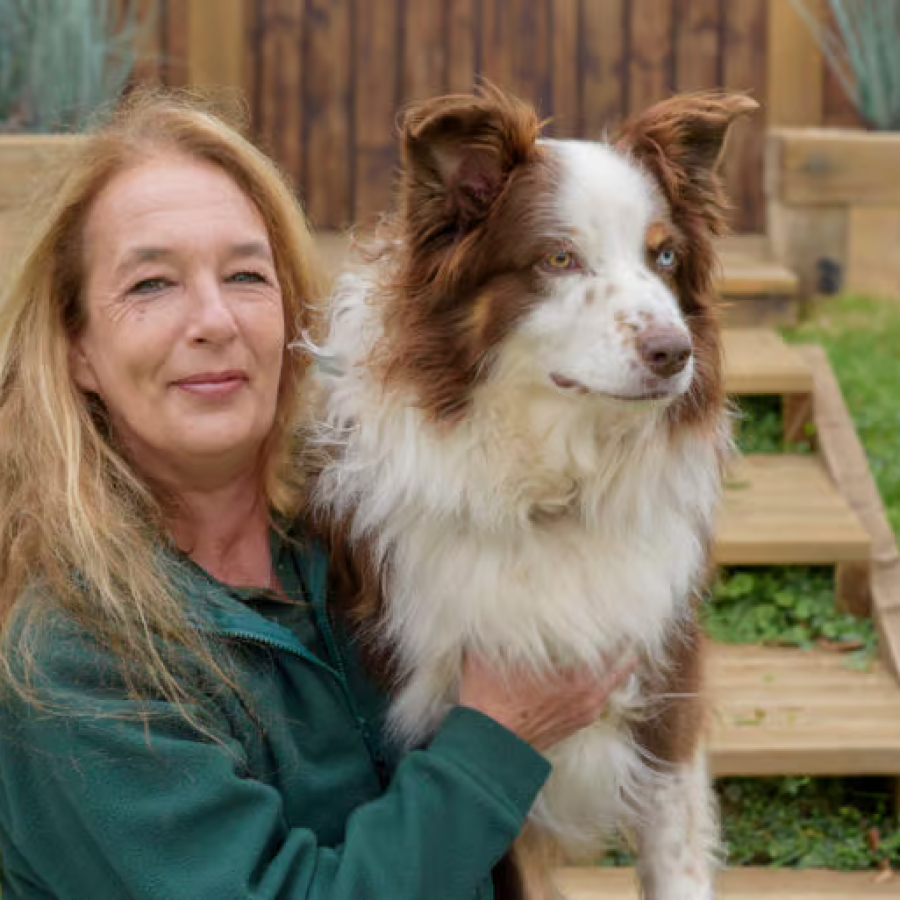
Bulldog Dog Breed
The Bulldog is a chunky canine companion who enjoys lazing around doing nothing.

The Bulldog is a chunky canine companion who enjoys lazing around doing nothing.
Breeds like this have extreme conformation, including exaggerated body features or a flat face and shorter nose (brachycephalic). These characteristics can negatively affect their health and welfare, and you may face higher insurance and veterinary costs. For these reasons, we wouldn’t recommend buying this type of dog. See here for more information.
If you decide to go ahead, please consider rescuing a dog in need rather than buying a puppy.
The British Bulldog was originally bred for something called bull baiting, a gruesome sport that was banned many years ago. Today, Bulldogs aren't as athletic as their ancestors, but they’re still incredibly strong. It can be expensive to own a Bulldog as they’re prone to various health conditions and vet treatment is not cheap.
Bulldogs can be tricky to motivate, they’re notoriously stubborn and if they don’t want to go somewhere, they’ll put the brakes on and won’t budge until they’re good and ready. That’s not to say they don’t have little outbursts of energy though. Once they’ve matured, they love nothing more than snoozing on the sofa, snoring the day away.
Bulldogs are not overly playful, but they do seek a lot of attention from their owners. Be prepared for lots of slobber! One shake of their huge head after eating or drinking results in a big clean-up operation.
Disclaimer
While these breed traits give a general idea of what to expect from a specific type of dog, it's important to remember that every dog is unique. Just like people, each dog comes with their own distinct personality, quirks, and characteristics!

The Bulldog is a heavy breed, and these solid dogs don’t always realise their own strength. They’re not known for being aggressive towards people, but they are likely to accidentally knock small children over as they barge past them. For this reason, they are best suited to older children who can respect the family dog and know to leave them alone when they’re resting, and who can cope with the boisterous side of their personality.
Yes! Bulldogs are VERY affectionate and fancy themselves as lap dogs, regardless of their size. Prepare for your legs to get squashed as your Bulldog clambers onto the sofa for some attention.
Bulldogs have a habit of stopping dead in their tracks if they decide they’ve walked too far. Encouraging them to move can be challenging, to say the least! Male Bulldogs aren’t overly tolerant of other dogs, especially other males, they’re self-assured and confident so it’s important they know their boundaries, or they’ll run rings around you.
Bulldogs absolutely love their people, so they can struggle to cope on their own. They are known for guarding their toys too so be aware of their tenacious attitude.
As with all dogs, provided their needs are met and they receive good socialisation and training, a Bulldog can make a great companion.
Bulldogs aren't best suited to first-time dog owners; they thrive in a home with humans who already have experience. They cannot handle long walks, so bear that in mind if you’re looking for a hiking buddy, a Bulldog might not be the one for you. They do enjoy a bit of a social life, so trips in the car or short, interesting walks make for a good day out. So long as you provide them with lots of space to spread out and a cosy spot on the sofa, they’ll be content canines.
Bulldogs are not particularly tolerant of other animals though, so keep that in mind if you have another dog. If you have one of the opposite sex, they can get on if they’ve been introduced properly. A good quality diet is essential to help reduce potential allergies and settle their sensitive tummies. Bulldogs like company and will not suit a home where they will need to be left more than a few hours at a time.
Bulldogs don’t need much exercise at all, in fact, a couple of 15 to 20-minute walks a day is enough. Be mindful on warm days not to walk your dog if the temperature is over 20 degrees. They are vulnerable to the heat and at risk of heat exhaustion due to their short noses.
It’s essential to keep them mentally active though with plenty of activities, toys and enrichment feeding (fun ways of giving your dog food, like from a puzzle feeder or a Kong toy).
All puppies need to learn how to be around people, pets, and other dogs, calmly and politely (known as socialisation). They also need help to feel calm, comfortable, and confident in everyday situations like travelling, the sound of traffic, and being in busy places (known as habituation). This is essential to prevent tricky behavioural problems in the future, and you'll be off to a great start with your ongoing training.
When it comes to dog training, Bulldogs are a tricky breed to motivate. They don’t get much enjoyment out of it unless there is something appealing on the other side. It’s best to start any sort of training with your Bulldog when they’re very young - you will need the tastiest treats you can find to hold their attention for any length of time.
Whilst a Bulldog is unlikely to win any obedience awards, it’s important they learn about the world around them. Socialisation and habituation (helping your dog understand the environment around them and introduce them to people and other animals) should be at the top of your ‘to-do’ list when you bring your puppy home.
Loose lead walking is a useful skill for your Bulldog to learn as they are incredibly strong. Always walk your Bulldog on a harness, not a collar or slip lead as this will affect their breathing.
The modern British Bulldog today looks nothing like their original ancestors. This is because breeders through the years have mixed their genetic make-up to the point where they are one of the most genetically unhealthy breeds available to pet owners.
Breathing problems are common in Bulldogs as well as allergies, eye problems, hip dysplasia, osteoarthritis, heart disease and a range of cancers.
Bulldogs require a specialised diet to reduce their risk of developing allergies and their weight must be monitored as they are prone to obesity.
I’m not a fan of long walks or warm weather. Short, interesting walks followed by a kip on the sofa will make me happy.
Whilst my body may not be up for a good workout, my mind certainly is! I enjoy playing with my toys and munching my chews.
I’m not easily motivated to train so you better have the best treats you can find if you want me to learn anything and I will do it in my own time.
Take our quiz to discover which breed is right for you
Take our quizPlease call our pet support line on 0300 303 9333 (7 days a week – 8.30am - 4pm)